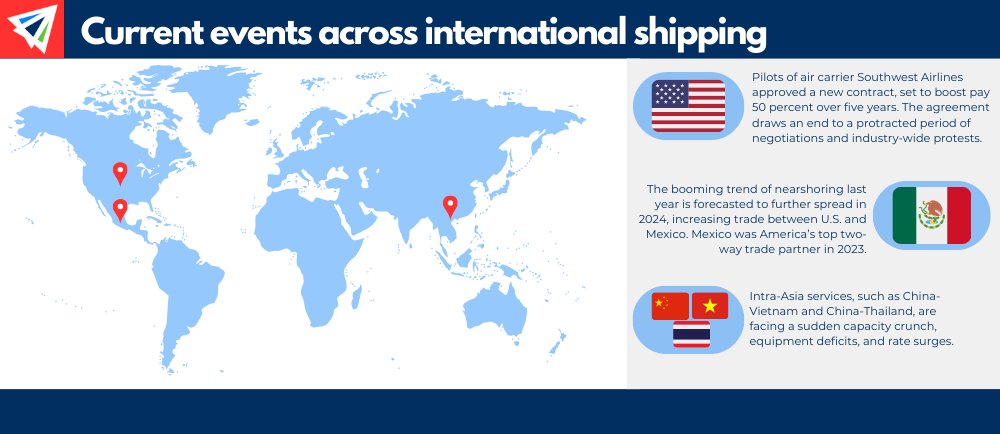Competitive Edge
January 24th, 2024
Stay Current with InterlogUSA
Latest Industry Happenings and Market Updates:

IMPORT: Asia to North America (TPEB)
Recent Developments:
- Major carriers implemented another round of general rate increases (GRIs) on January 15. These increases are in play for Asia services to all U.S. coasts.
- Surcharges remain imposed on transits through the drought-hit Panama Canal. Transit times continue to deteriorate.
- Carrier services remain transiting around Africa to avoid the Suez Canal. Transit times and rates have increased, while more capacity is being absorbed due to service requirements.
Rates: Rates have nearly doubled since late December. Longer transits (avoiding the Suez) will increase shipping demand measured in ton-miles (volume multiplied by distance), a factor further applying upward pressure on rates.
Space: Space has tightened amid external supply chain events.
Capacity: Longer transits averting the canals will absorb vessel capacity in order to maintain weekly services.
Equipment: There are no outstanding equipment deficits or bottlenecks.
TIPS:
- Chinese New Year begins Feb. 10 with related disruptions beginning days, if not a week, sooner. Establish a firm timeline for import activity as well as a vetted pool of multiple logistics providers. Do you need your freight out of China before the holiday or can you wait after?
- Hold your logistics partners accountable for frequent updates regarding current market conditions and routing impacts.
- Be flexible and adaptive to alternative service options, especially as it relates to potential savings on cost or transit.
IMPORT: Europe to North America (TAWB)
Recent Developments:
- Ocean carriers are implementing EU ETS surcharges onto trade lanes to and from E.U. countries to cover newfound costs from the program.
Rates: Rates have fallen since early January. This development signals that demand remains far too low for carriers to sustainably lift prices. Space: Space is open.
Capacity: Capacity remains in excess. Carriers are partially curbing this by reducing the size of vessels operating on transatlantic lanes. However, blank sailing activity remains minimal.
Equipment: Availability on both origin and destination sides, unless advised otherwise.
TIPS:
- Book at least three weeks prior to the ready date.
- Communicate with your logistics partners to ensure that you’re up to speed on the EU ETS program and its evolving impacts on transatlantic trade.
EXPORT: North America to Asia
Rates: Rates are low and level.
Capacity: Space remains open, particularly from West Coast ports, however carriers remain curbing capacity via blank sailings and slow steaming as U.S. import demand remains challenged.
Equipment: Barge services in China will be temporarily suspended in early February due to this year’s Chinese New Year holiday.
TIPS:
- Insufficient communication with sailing schedules can lead to higher detention and demurrage fees as well as higher trucking and storage costs. Ensure your logistics partners are not keeping you and your cargo in the dark.
Freight News
Maersk and Hapag-Lloyd Form the "Gemini Cooperation": A New Vessel Agreement
New Year, New Alliance? That’s what Maersk and Hapag-Lloyd say, though their new partnership is not set to begin until next year.
Starting February 2025, Maersk and Hapag-Lloyd will launch their new vessel agreement with a pool of about 290 vessels – which has the capacity to handle 3.4 million TEUs, per the Maritime-Executive. Maersk will be providing 60 percent of the capacity, while Hapag-Lloyd bringing up the remaining 40 percent.
This agreement will cover 7 trade lanes: Asia-North Europe, Asia-Mediterranean, Middle East & India – Europe, Asia – Middle East, Asia – U.S. East Coast, Asia – U.S. West Coast & trans-Atlantic.
According to Maersk’s announcement, a main focus of this partnership will be on reliability, hoping to deliver schedule reliability above 90 percent once the network is fully phased in service. Other focuses will be competitive transit times and the decarbonization of their fleets.
Cargo Plane Makes Emergency Landing at Miami Airport, Due to Engine Malfunction
A Boeing 747 cargo plane had to make an emergency landing at Miami Airport on January 18th, due to an engine malfunction.
Shortly after the plane took off (which was originally making it’s way to Luis Munoz Marin International Airport in Puerto Rico), an engine failure was reported, which resulted in the plane making a safe landing to Miami International Airport.
This incident went “viral” on X (formerly known as Twitter), with videos and images showing flames shooting out of the Boeing 747.
An inspection will be conducted to determine the cause. “The safety of the flying public, not speed, will determine the timeline for returning these aircraft to service,” the Federal Aviation Administration said in a statement.
However, a preliminary examination showed a “softball sized hole above the #2 engine,” – early reports say.
Watch Last Week's Webinar!
TOPICS: The State of Global Trade
– Updates on the Red Sea/Suez Canal and the Panama Canal
– Rates/Capacity, routing options, and how all, or any, of this impacts you.
Sign Up For Our February Webinar!
Our next webinar is Wednesday, February 21st, at 10am CST!
We will be announcing topics in the next couple of weeks.
(Please note: If you do not see your webinar invite after you register, please make sure to check your junk/spam folders. Reach out if you have any questions at [email protected])
If you have any topic suggestions or questions for our experts.. let us know!
Interlog  Insights
Insights
In last week’s insights we discussed Maersk & Hapag-Lloyd teaming up for a new alliance. Plus, some ocean carriers are pausing contract negotiations on the Europe-Asia trade lane.
Want to view last week’s insights? Email us at [email protected] and we’ll send you a copy. If you’d like to receive insights every Friday going forward, sign up here and you’ll start to receive Interlog Insights this Friday at 10am.
Sign up for our
industry answers
Our team works to provide valuable, unique, and relevant content to assist you in finding solutions. Sign up now.

